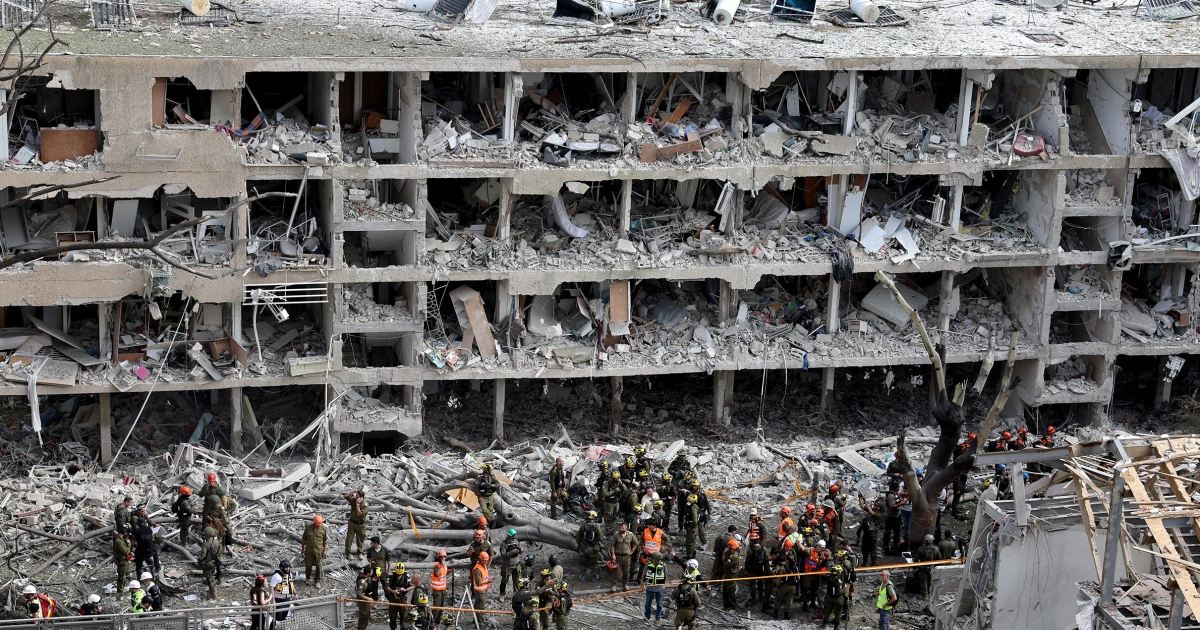The Iranian parliament is moving to close the Strait of Hormuz following the U.S. attack on three of the country’s nuclear sites, according to Iranian state-owned media organization Press TV.
Iran is closing the strait, which is critical for global trade, in response to America’s actions and the international community’s inaction, the outlet reported.
NBC News has not independently verified the closure of the waterway.
New York state is on “high alert” after Trump announced that the U.S. struck three nuclear sites in Iran, according to Gov. Kathy Hochul.
“We are not aware of any specific or credible threat to New Yorkers,” Hochul said in a statement. “However, given New York’s distinctive global profile, we are taking this situation extraordinarily seriously.”
All state agencies, utilities and other critical infrastructure facilities are on high alert for any possible disturbances, she said, and the MTA and the Port Authority have activated counterterrorism protections in partnership with local law enforcement.
New York State Police will continue ongoing safety patrols outside houses of worship and other at-risk sites, according to Hochul.
“I recognize this is a time of fear and uncertainty for New Yorkers. We have some of America’s largest Jewish and Muslim communities, and many have loved ones in the region,” Hochul said. “As we work to keep New Yorkers safe, we pray for the safety of our American troops, for speedy deescalation of this conflict, and for durable peace in the region.”
President Donald Trump shared a post to Truth Social hours after his administration’s decision to attack Iran, touting “great unity in the Republican Party, perhaps unity like we have never seen before.”
“Now let’s get the Great, Big, Beautiful Bill done,” Trump wrote, referring to his proposed budget reconciliation bill. “Our Country is doing GREAT. MAGA!”
The morning after the U.S. military executed an operation against three Iranian nuclear facilities, the Trump administration appears unified in its message to the regime that retaliation would be a severe mistake. NBC News’ Garrett Haake reports from the White House on President Donald Trump’s message, along with his Cabinet secretaries.
President Donald Trump is claiming success from the U.S. military strike to cripple Iran’s nuclear capabilities, yet there is uncertainty on how leaders in the Middle East will respond. NBC News’ Matt Bradley reports from Tel Aviv on how Iran has been perceived by other nations in the region in recent decades and how that may indicate Middle Eastern leaders’ reaction to the current strikes.
Additional personnel working for the U.S. Embassy in Baghdad left the country yesterday and today, according to a security alert from the embassy.
The embassy said the U.S. mission to Iraq began “the orderly departure” of some of its personnel on June 12 “out of an abundance of caution.” The embassy and the consulate general in Erbil have also temporarily suspended routine visa services but will continue providing services for U.S. citizens.
“There is increased potential for foreign terrorist organization-inspired violence or attacks against U.S. businesses and locations frequented by U.S. citizens,” the embassy warned. “We urge all U.S. citizens in Iraq to avoid locations frequented by foreigners and any large gatherings or crowds.”
Sen. Tom Cotton, R-Ark., said in an interview on ABC News’ “This Week” that while the Chairman of the Joint Chiefs of Staff Dan Caine has said that the damage assessment is not yet complete, the U.S. strikes have “severely damaged Iran’s critical nuclear infrastructure.”
Cotton said that if Iran targets Americans in retaliation, “The military force you will see will make last night look like child’s play.”
He added that the U.S. has troops in the region and that the president has “no higher priority” than the safety of Americans.
The world’s largest direct-membership organization for shipowners, charterers, shipbrokers, and agents is warning that while it is still unclear how Iran will respond to Saturday’s U.S. attack on Iran’s nuclear facilities, the threat to commercial shipping in the waters around the Arabian Peninsula has risen.
“The Houthi threat against shipping in the Red Sea and Gulf of Aden has also gone up,” said Jakob Larsen, head of security at Bimco, which represents global shipowners. “The Houthis now threaten merchant ships with affiliation to Israel or the U.S., but attacks against merchant ships with other affiliations cannot be ruled out.”
Larsen said it is expected that U.S. warships and merchant ships affiliated with Israel or the U.S. would be the preferred targets for the Iranians.
In an email to CNBC, a Hapag Lloyd spokesperson tells CNBC, “We currently are still crossing the Street of Hormuz. Alert level is high, though, and things might change by the hour.”
Read the full story here.
Markets across the Middle East ended mostly higher on Sunday after the United States entered the war between Israel and Iran and struck three key Iranian nuclear sites, Fordo, Natanz and Isfahan.
Stocks in Tel Aviv reached an all-time high on Sunday on bets that Washington’s entrance into the conflict with Tehran would help it to come to an end, despite the Iranian Foreign Minister’s insistence that the country could not return to diplomacy “while under attack.”
The broader TA-125 index was trading 1.77% higher on Sunday, while the TA-35, Tel Aviv’s blue-chip index, was up 1.5%. Equities climbed in Israel last week after the country hit targets in Iran.
Read the full story here.
Israel struck multiple cities in Iran today, including the central city of Yazd for the first time, the IDF said in a statement.
The country’s air force struck what it said are dozens of military targets, including missile and unmanned aerial vehicle sites in Isfahan, Bushehr, Ahvaz and Yazd. This includes the Imam Hussein Strategic Missile Command Center in Yazd, “where long-range Khorramshahr missiles were stored” and around 60 were launched toward Israel, according to the IDF.
“During the strikes, an IAF aircraft identified Iranian Armed Forces soldiers loading missile launchers and eliminated them,” the IDF said. “The IDF will continue to reach and strike in any area within Iranian territory to eliminate threats posed to the State of Israel.”
NBC News has not been able to independently verify any of the IDF’s claims.
A gas field in Iran’s southwestern Bushehr province was hit by Israeli strikes earlier today, the state-run Fars news agency reported.
Parts of the area “caught fire as a result,” the agency reported, adding that eyewitnesses said a drone was used to carry out the attack.
Earlier, the Israeli military said in a statement that it had carried out strikes on several parts of Iran, including Bushehr.
Missile launchers, military sites for the production of air defense batteries and a command center were hit, along with a drone storage center, it said. Iranian military personnel were also killed, the statement added.
Secretary of State Marco Rubio said in an interview on Fox News that if Iran retaliates, “it’ll be the worst mistake they’ve ever made.”
He added that the U.S. “can fly in and out of Iran at will.”
“We are not declaring war on Iran,” Rubio said. “We’re not looking for war in Iran, but if they attack us, then I think we have capabilities they haven’t even seen yet. It would be a terrible mistake on their part, and frankly, it’s not what we hope for or wish.”
The U.N. Security Council is expected to hold an emergency meeting today at Tehran’s request following U.S. strikes on Iran’s nuclear sites last night, U.N. sources tell NBC News.
Iranian Foreign Minister Abbas Araghchi said today the action by a permanent member of the U.N. Security Council member was “a flagrant breach of the UN Charter” and dealt “a devastating blow” to the global nonproliferation regime.
“The Islamic Republic of Iran, calls on the Security Council to convene an emergency session to unequivocally condemn the criminal act of aggression by the United States against Iran and to hold the administration in Washington accountable for its violations of fundamental principles of United Nations Charter and of norms of international law,” the Iranian foreign minister said adding, “Silence in the face of such blatant aggression will plunge the world into an unprecedented level of danger and chaos.”
The emergency meeting was first reported by Reuters.
Bahrain is calling for de-escalation after the U.S. attacked three nuclear facilities in Iran.
The kingdom emphasized “the need for coordinated regional and international efforts to halt escalation and military operations” and called for a return to negotiations between the U.S. and Iran, according to a statement.
“This approach aims to restore peace and security in the region and spare its people the horrors and dangers of war,” that statement read.
According to an Arab diplomatic source, when asked whether Sen. Lindsey Graham is correct that a Saudi-Arab-Israel deal is now back on track, the source said, “I doubt any deal will be done but it depends now whether this becomes a war of attrition.”
The source went on to say that what happens next depends on whether Iran feels weak and is willing to come to the table, or whether Iran is embarrassed and feels it has to strike back. It might not retaliate against U.S. troops but use proxies elsewhere in the region and against U.S. allies.
And it depends on how much Israeli Prime Minister Benjamin Netanyahu is now willing to make a deal on Gaza. The Saudis are very clear that the Palestinian issue has to be resolved before anything else can happen.
NBC News analyst Jeremy Bash, former chief of staff at the Pentagon and the CIA, said Iranian options for retaliation after the U.S. struck three nuclear facilities include going after U.S. military assets and having groups affiliated with Iran, like the Houthis, fire on U.S. vessels.
Bash said the U.S. will posture in the region to prevent and deter Iran from waging any significant retaliation.
More than 125 American aircraft took part in the mission that struck three Iranian nuclear sites, Air Force Gen. Dan Caine, the chairman of the Joint Chiefs of Staff, told a news conference earlier today.
B-2 stealth bombers were joined by fourth- and fifth-generation fighter jets and “dozens and dozens of air refueling tankers,” Caine said, adding that a full array of “intelligence, surveillance and reconnaissance aircraft” also joined the mission, which led to strikes on the Fordo, Natanz and Isfahan nuclear sites.
Caine said that at midnight Friday, a large “B-2 strike package comprised of bombers” took off from the U.S. Part of this package headed west and into the Pacific “as a decoy,” he said.
“The main strike package comprised of seven B-2 Spirit bombers, each with two crew members, proceeded quietly to the east with minimal communications throughout the 18-hour flight to the target area,” Caine said.
Once over land, the bombers were refueled before they linked up with “escort and support aircraft in a complex, tightly timed maneuver requiring exact synchronization,” he said.
Just before the planes entered Iranian airspace at around 5 p.m. ET, Caine said an American submarine “ launched more than two dozen Tomahawk land attack cruise missiles against key surface infrastructure targets at Isfahan.”
Several deception tactics were also employed, he said, including decoy planes pushing “out in front of the strike package at high altitude and high speed.”
At about 2:10 a.m. local time (6:40 p.m. ET), Caine said the lead B-2 dropped two GBU-57 Massive Ordnance Penetrator weapons on “the first of several aim points at Fordo.” In total 14 of the bombs known as “bunker busters” were dropped on two nuclear target areas, he said.
All three Iranian nuclear infrastructure targets were struck between 6:40 and 7:05 p.m. ET, he added.
Following the strikes, Caine said, the bombers exited Iranian airspace and began their return home.
Dozens of people have been arrested in Iran over alleged ties to Israel, the deputy police commander of Fars province said, according to semiofficial state media.
At least 52 people were detained on charges of disturbing public opinion, possessing and storing drones or drone parts, as well as filming sensitive areas and sending the footage to opposition media outlets, the IRGC-linked semiofficial Fars news reported.
NBC News was not immediately able to independently confirm the arrests or the related charges.
A growing number of similar arrests have been reported in Iran, as well as in Israel, over alleged ties to opposing sides as the two countries continue to trade strikes, with the U.S. also now stepping into a larger role in the conflict.
Iran said the three nuclear facilities struck by the U.S. were evacuated before being hit. U.S. defense officials say they still need to complete a full battle damage assessment. NBC News’ Richard Engel reports on Iran’s response to the attacks.
Reporting from Dubai, United Arab Emirates
The location of the 400 kilograms (880 pounds) of 60% enriched uranium has not been revealed by Iran, Israel or the U.S., but it is central to what happens next.
If the uranium has been sealed inside the Fordo nuclear facility, Israeli and U.S. teams will be racing to establish that it is now out of reach.
Reporting from Washington
Vice President JD Vance said Sunday that the U.S. is not at war with Iran, but with Tehran’s nuclear weapons program, and declined to confirm with 100% confidence that the country’s nuclear sites had been completely destroyed.
During an interview on NBC News’ “Meet the Press,” moderator Kristen Welker asked the vice president whether the U.S. was now at war with Iran after President Donald Trump said the U.S. military had dropped bombs on three Iranian nuclear sites on Saturday.
The move marked the first time that the U.S. had attacked Iran and prompted concerns about whether attacks could drag the U.S. into a wider war. Hours later, Iran launched retaliatory strikes against Israel, causing damage in Tel Aviv.
“We’re not at war with Iran,” Vance said. “We’re at war with Iran’s nuclear program.”
Submarines began launching Tomahawk missiles at 5 p.m. ET on Saturday, The time of target was 6:40 p.m. ET, or about 2:10 a.m. local time, to 7 p.m. ET.
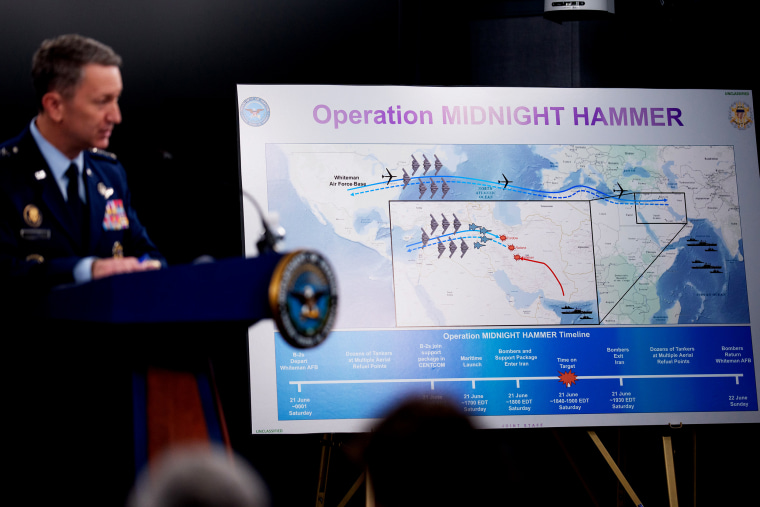
Joint Chiefs Chairman Dan Caine discusses the mission details during a news conference at the Pentagon today.Andrew Harnik / Getty Images
More than 125 U.S. military aircraft participated in the operation. The B-2s hit Fordo and Natanz. The submarines hit Isfahan with Tomahawks. More than 75 total weapons were used. This was also the military’s first operational use of GBU-57s, and more than a dozen were used.
It was the largest B-2 operational strike in U.S. history and the second-largest B-2 mission ever flown, only exceeded by missions after 9/11. The military launched B-2s to the Pacific as a decoy, part of a deception effort.
Joint Chiefs Chairman Dan Caine said that the mission was successful in that it appears Iran did not fire on the U.S. aircraft at any point in the attack and Iranian fighter jets were not scrambled to intercept them.
It is not known if Iranian forces did not see the U.S. planes because they are designed to not be detected by radar.
“Iran’s fighters did not fly, and it appears that Iran’s surface-to-air missile systems did not see us throughout the mission. We retained the element of surprise,” the general said. Cain added, though, that the bomb damage assessment has not been completed. Given that the Pentagon does not have forces on the ground, it may be difficult for the U.S. to definitively know the damage.
Defense Secretary Pete Hegseth’s statement that Iran’s nuclear ambitions have been “obliterated” has not been independently confirmed and raises the core question this morning: Will Iran be able to covertly rebuild its nuclear program as North Korea did?
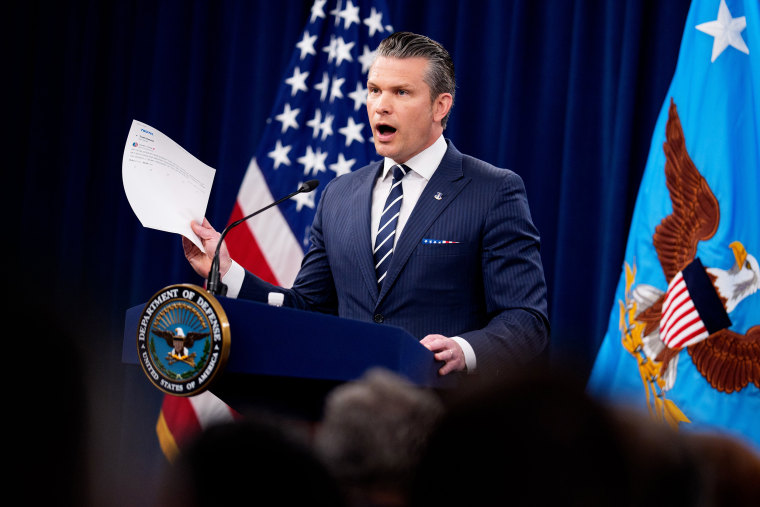
Defense Secretary Pete Hegseth speaking at the Pentagon today.Andrew Harnik / Getty Images
Gen. Dan Caine, the chairman of the Joint Chiefs of Staff, used more restrained language, saying there was “extremely severe damage” to the three facilities targeted by the U.S. but it was too early to know the exact damage to Iran’s nuclear capabilities.
In a press briefing this morning, Defense Secretary Pete Hegseth says the U.S. attacks were intended to “destroy or severely degrade” Iran’s nuclear program.
Operation Midnight Hammer targeted three nuclear facilities, Hegseth told reporters today, adding that the operation “did not target Iranian troops or the Iranian people.”
“The United States does not seek war, but let me be clear, we will act swiftly and decisively when our people, our partners or our interests are threatened,” he added. “The President Trump said no nukes. He seeks peace, and Iran should take that path.”
Concerns about a potential retaliation from Iran are growing after President Donald Trump revealed that the U.S. attacked three nuclear sites in the country. NBC News’ Hallie Jackson discusses how Americans are reacting to the strikes.
Iran has called on the United Nations Security Council to convene an emergency meeting “without delay” to discuss the United States’ strikes on its nuclear facilities, which the Iranian ambassador to the U.N., Amir Saeid Iravani, called a “blatant and unlawful act of aggression.”
In a letter sent overnight, Iravani called on the Security Council, of which the U.S. is a permanent member, to condemn Washington’s strikes “in the strongest possible terms.”
He further called on the council to “take all necessary measures” to ensure “that the perpetrator of such heinous crimes is held fully accountable and does not go unpunished.”
The U.S. is calling the military strikes against Iran Operation Midnight Hammer.
According to a defense official, the submarines began launching Tomahawk missiles at 5 p.m. ET yesterday. The time of the target was 6:40 p.m. ET to 7 p.m. ET.
The official added that more than 125 U.S. military aircraft participated in the operation. The B-2s hit Fordo and Natanz. The submarines hit Isfahan with Tomahawks. More than 75 total weapons were used. This was also the military’s first operational use of GBU-57s, and more than a dozen were used.
It was the largest B-2 operational strike in U.S. history and the second-largest B-2 mission ever flown, only exceeded by missions after 9/11. The military launched B-2s to the Pacific as a decoy, part of a deception effort.
Iran had vowed to retaliate strongly if its nuclear sites came under attack. Now that they have, Tehran has to choose between retaliating and risking a wider war, or pausing and consolidating at home, said Burcu Ozcelik, a senior research fellow for Middle East security at the Royal United Services Institute, a London-based think tank.
“Iran’s options are both limited and incredibly risky,” she said in an emailed statement. De-escalation could allow the regime to focus “inwards to deter political instability, reinforce elite command and control, and manage the political fallout from 10 days of war with Israel.”
“But inaction carries its own cost — undermining Tehran’s credibility after years of vows to protect its nuclear program at all costs,” she added.
A military option, direct or through proxies, carries its own risks, and could invite punishing U.S. reprisals, particularly if American forces suffer casualties, she said. “Tehran’s next move may determine whether this war expands — or ends in uneasy, albeit possibly temporary, restraint,” she added.
IAEA Director General Rafael Grossi had said he plans to call an emergency meeting of the agency’s board of governors on Monday to discuss the “urgent situation” in Iran following the United States’ attacks on its nuclear facilities.
“In view of the increasingly serious situation in terms of nuclear safety and security, the Board of Governors will meet in an extraordinary session tomorrow, which I will address,” Grossi said in a statement.
He said that the IAEA had been informed by the Iranian regulatory authorities that there has been no increase in off-site radiation levels after the attacks on three nuclear facilities, including the Fordo uranium enrichment site.
“As of this time, we don’t expect that there will be any health consequences for people or the environment outside the targeted sites,” he said. “We will continue to monitor and assess the situation in Iran and provide further updates as additional information becomes available.”
Satellite imagery captured by Planet Labs PBC following the United States’ strikes appears to show damage to the Fordo nuclear facility, the site shrouded in secrecy and dug deep into a mountain, The Associated Press has reported.
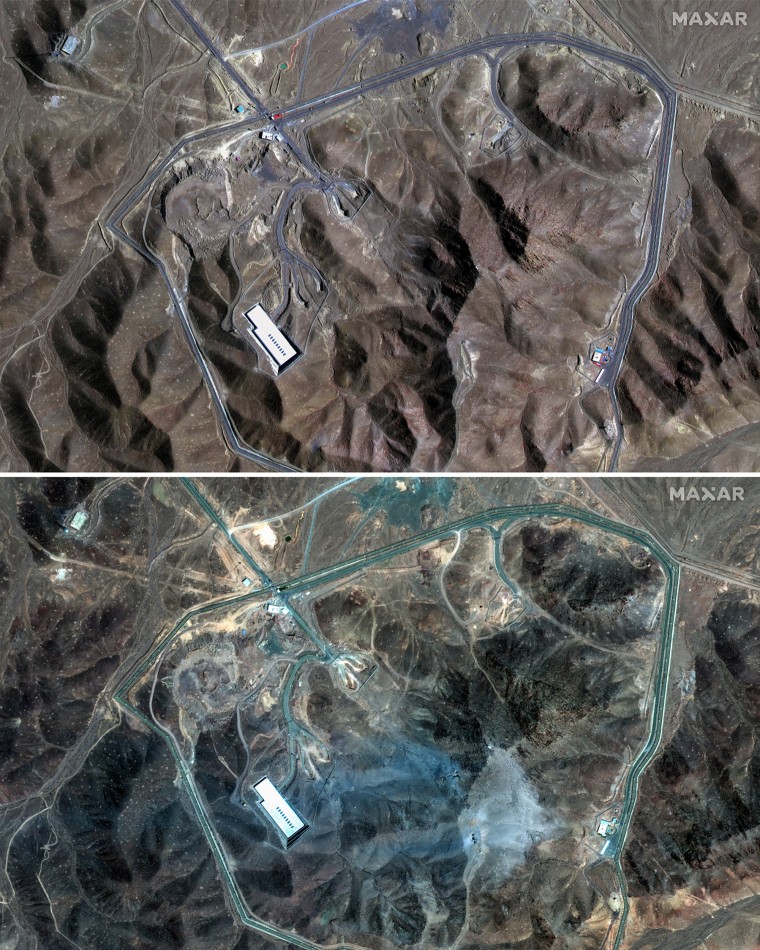
Fordo nuclear facility on 20 June, top, and the site today following the U.S. strikes.Satellite image ©2025 Maxar Technologies
According to the AP, an analysis of the imagery suggested some damage to the site, where gray smoke could be seen lingering in the air. The extent of the damage was not immediately clear.
One Iranian MP said the site had not been seriously damaged, disputing Trump’s claims that the nuclear facilities struck had been “obliterated.” NBC News was not immediately able to independently verify the situation on the ground.
NBC News’ Courtney Kube shares new details of the military strikes on Iran and reaction to President Donald Trump’s latest Truth Social post about a U.S. response to any retaliation by Iran.
U.S. military assets, consulates and embassies are scattered across the region, and are potential targets should Iran decide to retaliate for U.S. strikes on three of its nuclear facilities.
Fears were growing among Iranians this morning as they grappled with the aftermath of Washington’s strikes on the country’s nuclear facilities — and what the escalation could mean for the days ahead.
“You can’t fight the United States,” Naser, a local resident in his 70s, told NBC News. “Iran should avoid war with the U.S. at all costs.”
Naser said that if at least one objective of Israel’s — and now the United States’ strikes — was to spur regime change by “tearing down the infrastructure” and inspiring the masses to “rise up,” he felt it was bound to fail. “The people won’t rise up to overthrow the system,” he said. “They’re just in shock.”
“I’ve lived through two wars and a revolution,” he said, lamenting the increasingly worrying state of affairs. “This country should be in a different place by now.”
There is “no threat” to local residents in areas surrounding Iran’s nuclear sites that were hit in the United States’ overnight attacks, Iran’s Atomic Energy Organization has said.
”We immediately conducted the necessary tests to assess any potential radioactive leakage around the targeted sites,” the organization said today.
It came after Trump said the sites were “completely and totally obliterated.”
Russia condemned the U.S. strikes on Iran today, with its foreign ministry saying “a dangerous escalation has begun.”
“The irresponsible decision to subject the territory of a sovereign state to missile and bomb strikes, no matter what arguments are used, is a gross violation of international law,” the ministry said in its statement.
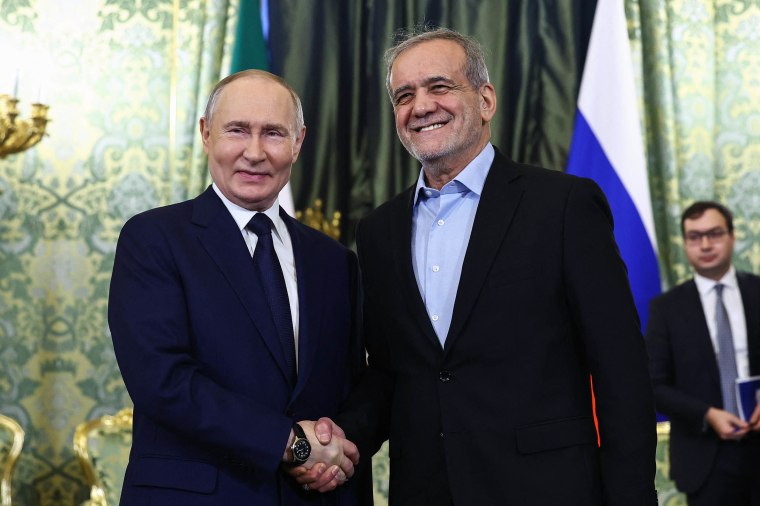
Russian President Vladimir Putin and Iranian President Masoud Pezeshkian in Moscow in January.Evgenia Novozhenina / AFP via Getty Images file
Russia echoed previous Iranian statements, saying the attacks had undermined the nuclear nonproliferation treaty and “caused enormous damage to the authority of the NPT and the IAEA verification and monitoring system based on it.”
Iranian Foreign Minister Abbas Araghchi said that he will meet Russian President Vladimir Putin tomorrow.
The Pentagon is expected to deliver a news briefing this morning at 8 a.m. ET, as many questions remain around the U.S. strikes on Iran.
When Trump announced strikes last night, he did not say why he chose this as the timing for the attack. It is unclear if there was new intelligence that Iran was moving nuclear fuel to other locations or if the enrichment had reached a certain threshold.
Trump also did not say if the ongoing negotiations with Iran had reached a stalemate or how U.S. would respond to an Iranian retaliation.
Iran’s Fordo nuclear facility was not seriously damaged in the U.S. strike on the site, buried deep beneath a mountain, an Iranian parliament member said today, disputing Trump’s claims of having “obliterated” Tehran’s nuclear stations.
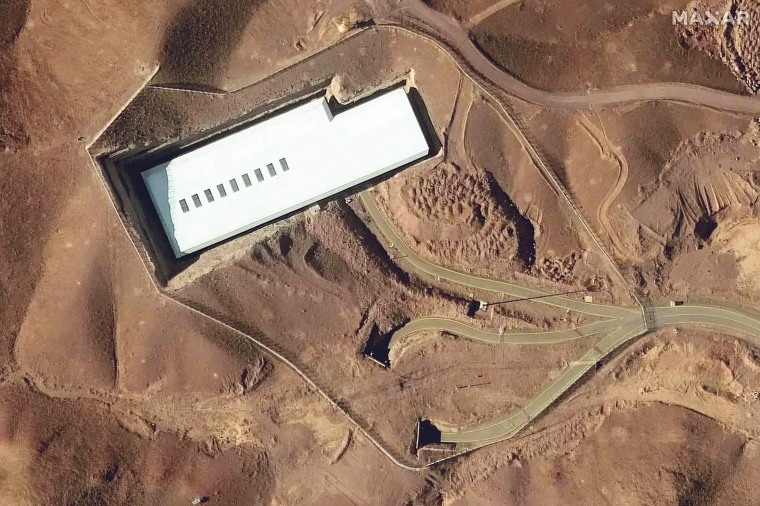
A satellite image of the Fordo nuclear facility, south of Tehran, on Feb. 12.Maxar Technologies / AFP via Getty Images, file
“I can state that contrary to the claims of the lying US president, the Fordo nuclear facility has not sustained serious damage,” Manan Raeisi, MP for Qom, said, according to the IRGC-linked semiofficial Fars news agency. “Most of what was hit was above ground and is restorable.”
Raeisi said that anything that might have “posed a risk to the public” had already been removed in advance from the site. He added that no radioactive emissions had been reported.
Still, Raeisi said “we consider even this act of aggression as direct US involvement in the war and now it is Iran that will decide how and in what way to respond to this blatant act of folly by America.”
Over Friday and Saturday, the traffic back into Tehran was heavy. People who had evacuated were returning to the city after what had felt like two days of relative calm that they hoped would stretch into more. Some government offices were meant to open today.
Instead, that sense of calm was proved false by the U.S. strikes last night.
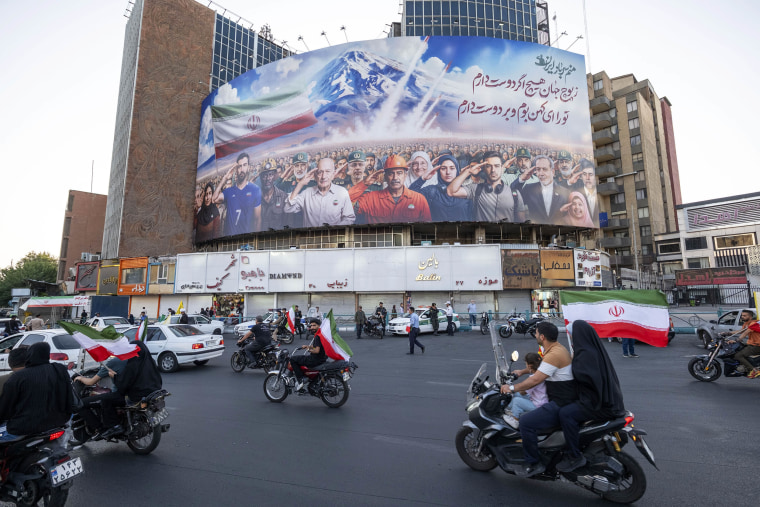
Downtown Tehran yesterday.Morteza Nikoubazl / NurPhoto via Getty Images
Now, there’s heightened security entering Tehran: multiple checkpoints along the roads, and cars are being thoroughly searched to identify any potential internal threats. The people who are returning are not doing it because it feels safe, but because they have to.
Inside Tehran, most places are still closed. Only essential medical services are running and maybe a few drugstores for urgent needs. Government jobs are on hold, some private companies are working remotely, and factories are opening if their workers are willing to return. Many are scared for their lives, and the city remains mostly empty and eerie, more empty even than during the pandemic.
Still, in typical Iranian fashion, people are finding humor in the situation. A common joke going around is on the concern from friends and relatives overseas: “Instead of cutting off our internet here, they should disconnect the Iranians abroad. They’re calling every minute, reading the news and getting worried, and it’s getting on our nerves having to respond and explain to them all the time.”
Iran never fully trusted Western diplomacy before, Abbas Araghchi, the Iranian foreign minister, told reporters in a briefing today, “and there are now even more reasons why we shouldn’t trust them at all.”
“There are variety of options available to us,” he said. “Let’s wait for our response, and when the aggression is ended we decide how to engage in diplomacy once again.”
Araghchi also called the Trump administration “warmongering” and “lawless.”
Iranian Foreign Minister Abbas Araghchi said he will consult with Russian President Vladimir Putin tomorrow, saying Trump has deceived American voters by walking back his promise to end U.S. involvement in “forever” wars.
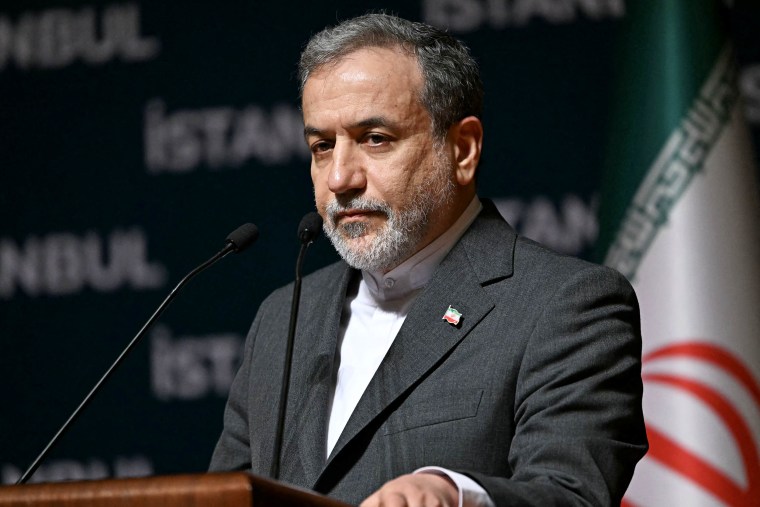
Iranian Foreign Minister Abbas Araghchi at a press conference in Istanbul today. Ozan Kose / AFP via Getty Images
“Russia is friend of Iran,” Araghchi just told reporters, adding Iran always briefed Russia about its negotiations with the U.S. including “any progress or lack of progress.”
The Trump administration “is solely and fully responsible for the dangerous consequences and far-reaching implications of its act of aggression,” he said, adding, “Iran has done nothing wrong.”
“We don’t understand why Iran should be attacked for a false accusation that Iran is seeking nuclear weapons,” he said.
The U.S. and Israel must await “regrettable” responses beyond their calculations, Iran’s Islamic Revolutionary Guard Corps said as it vowed to defend Iran’s dignity and security.
“American bases in the region are not strongholds but points of vulnerability,” it said in a statement carried by the IRGC-linked semiofficial Fars news agency.
The IRGC also said it has identified and is monitoring the “origin of the attacking aircraft.”
“The American attack on Iran’s peaceful nuclear facilities is a clear act of aggression, a crime, and a violation of the UN Charter, international law, and the NPT,” it said, referring to the nuclear nonproliferation treaty.
The Israeli military says it has recovered the remains of three hostages held in the Gaza Strip. It identified them as Yonatan Samerano, 21; Ofra Keidar, 70; and Shay Levinson, 19.
All three were killed during Hamas’ Oct. 7, 2023, attack into Israel that ignited the ongoing war. The militant group is still holding 50 hostages, less than half of them believed to be alive.

From left, Yonatan Samerano, Ofra Keidar and Shay Levinson.@IsraelinUK / X
Kobi Samerano said in a Facebook post that his son’s remains were returned on what would have been Yonatan’s 23rd birthday.
“The campaign to return the hostages continues consistently and is happening alongside the campaign against Iran,” Prime Minister Benjamin Netanyahu said in a statement.
Iranian Foreign Minister Abbas Araghchi responded today to Trump’s calls for Iran to negotiate by saying it is the U.S and Israel that first “decided to blow up that diplomacy.”
“Last week, we were in negotiations with the US when Israel decided to blow up that diplomacy. This week, we held talks with the E3/EU when the US decided to blow up that diplomacy,” he said in a post on X.
“What conclusion would you draw? To Britain and the EU High Rep, it is Iran which must ‘return’ to the table. But how can Iran return to something it never left, let alone blew up?” he added.
The head of Iran’s Atomic Energy Organization has called on the International Atomic Energy Agency to investigate the “unlawful actions” of the U.S. after it struck three of Iran’s nuclear facilities last night.
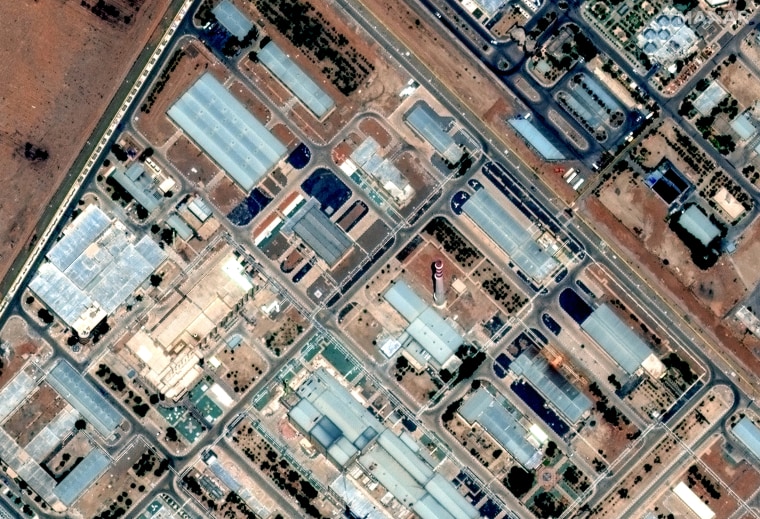
The Isfahan nuclear enrichment facility in central Iran on June 3.Maxar Technologies / AFP via Getty Images, file
“These attacks on Natanz, Fordow, and Isfahan by a permanent member of the UN Security Council is a clear violation of international law,” said Mohammad Eslami, calling the attack a “blatant violation,” of the nuclear nonproliferation treaty.
“I urge the Director General to end this inaction and, based on the agency’s legal responsibilities, condemn these violations and take appropriate measures,” he said.
Israel’s emergency services have evacuated 16 casualties to hospital after a wave of Iran strikes hit Tel Aviv this morning.
Magen David Adom shared images of blown-up buildings reduced to rubble in the Ramat Aviv neighborhood in northwest Tel Aviv. Aerial footage from Israel’s Channel 12 showed collapsed roofs and widespread destruction at the same site.
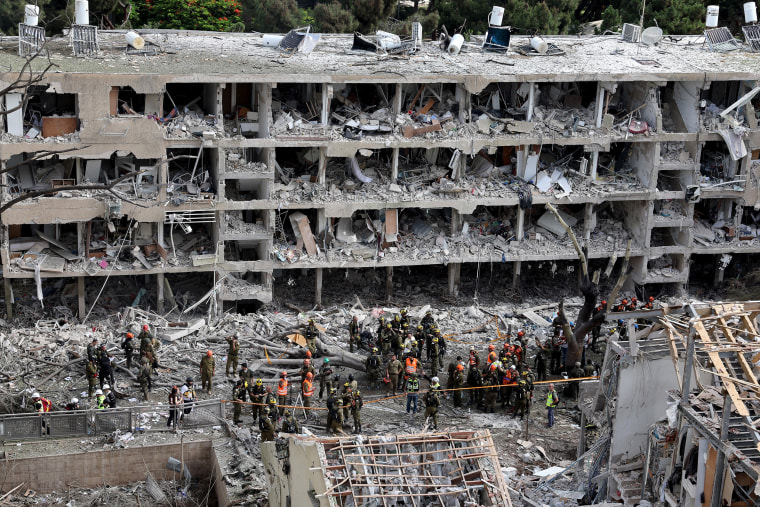
Israeli security forces and first responders at a building damaged by an Iranian strike today.Jack Guez / AFP – Getty Images
“A 30-year-old man was in moderate condition, and 15 others are in mild condition,” according to Magen David Adom.
“Multiple sites being searched across Israel by MDA EMTs and Paramedics,” it said.
The U.S. struck Iran’s Fordo nuclear facility with “six huge bunker buster bombs,” Fox News’ Sean Hannity told listeners last night, citing a phone call with President Donald Trump.
Only the U.S. is known to have the 30,000-pound “bunker buster” bombs needed to damage Iran’s Fordo nuclear enrichment facility, which is located 300 feet under a mountain.
Hannity added that Iran’s Natanz and Isfahan nuclear facilities “were wiped out with 30 Tomahawk missiles launched by American submarines some 400 miles away.”
The Trump administration is bracing for potential retaliation from Iran, with the next 48 hours being of particular concern, according to two defense officials and a senior White House official.
It’s unclear whether any retaliation would target overseas or domestic locations, or both, the officials said.
Two officials familiar with military planning said earlier in the week that Iran already has plans on the books to target U.S. bases and assets in the Middle East if the need arises, though they cautioned at the time there were no indications of imminent deployment of the plans.
U.S. bases and assets have been at their highest state of alert for months, but after Israel began warring with Iran on June 13, the officials who spoke earlier in the week said concerns were heightened even more about the potential for attacks on U.S. assets from Iran or its proxies in the region.
Trump warned Iran on Truth Social that “ANY RETALIATION” made “AGAINST THE UNITED STATES OF AMERICA” will be met with even greater force than what was unleashed today. He closed the post by saying, “THANK YOU! DONALD J. TRUMP, PRESIDENT OF THE UNITED STATES.”
Iranian Foreign Minister Abbas Araghchi said his nation “reserves all options” in responding to the attack on its nuclear sites by the United States.
“The events this morning are outrageous and will have everlasting consequences,” he said in a statement on X. “In accordance with the UN Charter and its provisions allowing a legitimate response in self-defense, Iran reserves all options to defend its sovereignty, interest, and people.”
He characterized the U.S. attacks as a “grave violation” of the United Nations’ charter, international law and the global Treaty on the Non-Proliferation of Nuclear Weapons.
The MAGA movement’s top influencers were divided over bombing Iran until Trump did just that tonight.
Now, at least for the time being, the lay leaders in Trump’s base appear to be rallying around a position that spares him criticism: Direct attacks on Iranian nuclear facilities are justified, as long as American troops aren’t sent into a third full war halfway around the world in the last quarter of a century.
“People don’t want an escalation where ground troops are sent in, but this is not Iraq,” said Ryan Girdusky, a Republican consultant who worked for a super PAC that backed Vice President JD Vance’s 2022 Senate campaign in Ohio. Girdusky predicted the MAGA base will swing in line behind Trump.
In an address to the nation tonight, Trump said Iran’s key nuclear enrichment facilities were “completely and totally obliterated,” adding that any future attacks would be “far greater and a lot easier.”
“If peace does not come quickly, we will go after those other targets with precision, speed and skill. Most of them can be taken out in a matter of minutes,” Trump said.
